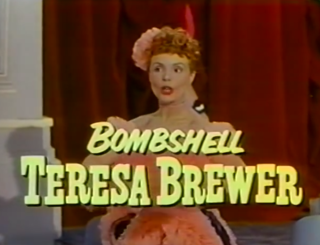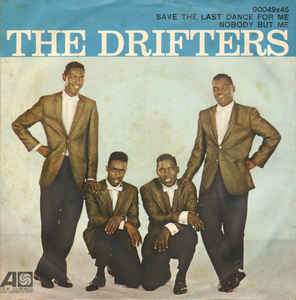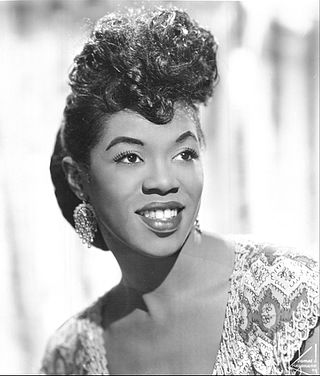Related Research Articles

Franklin Joseph Lymon was an American rock and roll/rhythm and blues singer and songwriter, best known as the boy soprano lead singer of the New York City-based early rock and roll doo-wop group The Teenagers. The group was composed of five boys, all in their early to mid-teens. The original lineup of The Teenagers, an integrated group, included three African-American members, Lymon, Jimmy Merchant, and Sherman Garnes; and two Puerto Rican members, Joe Negroni and Herman Santiago. The Teenagers' first single, 1956's "Why Do Fools Fall in Love", was also their biggest hit. After Lymon went solo in mid-1957, both his career and that of The Teenagers fell into decline. In 1968, Lymon was found dead at the age of 25 on the floor of his grandmother's bathroom from a heroin overdose. Lymon was posthumously inducted into the Rock and Roll Hall of Fame in 1993 as a member of the Teenagers. His life was dramatized in the 1998 film Why Do Fools Fall in Love.

Clara Ann Fowler, better known by her stage name Patti Page, was an American singer. Primarily known for pop and country music, she was the top-charting female vocalist and best-selling female artist of the 1950s, selling over 100 million records during a six-decade-long career. She was often introduced as "the Singin' Rage, Miss Patti Page". New York WNEW disc-jockey William B. Williams introduced her as "A Page in my life called Patti".

Teresa Brewer was an American singer whose style incorporated pop, country, jazz, R&B, musicals, and novelty songs. She was one of the most prolific and popular female singers of the 1950s, recording around 600 songs.
The Three Degrees are an African-American female vocal group formed circa 1963 in Philadelphia, Pennsylvania. Although 16 women have been members over the years, the group has always been a trio. The group were particularly successful in the UK, achieving 13 Top 50 hit singles between 1974 and 1985.

Pauline Matthews better known by her stage name Kiki Dee, is an English pop singer. Known for her blue-eyed soul vocals, she was the first female singer from the UK to sign with Motown's Tamla Records.
The Avons were a British pop vocal group. Originally composed of Valerie Murtagh and Elaine Murtagh, and known as 'The Avon Sisters', they added Raymond S. Adams, and changed their name to 'The Avons'.
"Blue Moon" is a popular song written by Richard Rodgers and Lorenz Hart in 1934 that has become a standard ballad. Early recordings included those by Connee Boswell and by Al Bowlly in 1935. The song was a hit twice in 1949, with successful recordings in the U.S. by Billy Eckstine and Mel Tormé.

"Fever" is a song written by Eddie Cooley and Otis Blackwell, who used the pseudonym "John Davenport". It was originally recorded by American R&B singer Little Willie John for his debut album, Fever (1956), and released as a single in April of the same year. The song topped the Billboard R&B Best Sellers in the US and peaked at number 24 on the Billboard pop chart. It was received positively by music critics and included on several lists of the best songs when it was released.

"I Can't Stop Loving You" is a popular song written and composed by country singer, songwriter, and musician Don Gibson, who first recorded it on December 3, 1957, for RCA Victor Records. It was released in 1958 as the B-side of "Oh, Lonesome Me", becoming a double-sided country hit single. At the time of Gibson's death in 2003, the song had been recorded by more than 700 artists, most notably by Ray Charles, whose recording reached No. 1 on the Billboard chart.

"Alison" is a song written by and first recorded by Elvis Costello in 1977 for his debut album My Aim Is True on Stiff Records. Costello claimed the song was written as an ode to a woman he saw working at a supermarket, though he has remained vague on the meaning. Though Costello's single never charted, it has become one of his most famous songs.
"Chapel of Love" is a song written by Jeff Barry, Ellie Greenwich and Phil Spector, and made famous by The Dixie Cups in 1964, spending three weeks at number one on the Billboard Hot 100. The song tells of the happiness and excitement the narrator feels on her wedding day, for she and her love are going to the "chapel of love", and "[they'll] never be lonely anymore." Many other artists have recorded the song.

"Save the Last Dance for Me" is a song written by Doc Pomus and Mort Shuman, first recorded in 1960 by American musical group the Drifters with Ben E. King on lead vocals. It has since been covered by several artists, including Dalida, the DeFranco Family, Emmylou Harris, Dolly Parton, and Michael Bublé.

"It's Only Make Believe" is a song written by drummer Jack Nance and Mississippi-born singer Conway Twitty, while they were touring across Ontario, Canada in 1958. Twitty was a relatively unknown rock n' roll singer at the time, and this song was his first hit, reaching No. 1 on the Billboard chart in November 1958 for two weeks.

"At the Hop" is a 1950s pop song written by Artie Singer, John Medora, and David White and originally released by Danny & the Juniors. The song was released in the fall of 1957 and reached number one on the US charts on January 6, 1958, becoming one of the top-selling singles of 1958. "At the Hop" also hit number one on the R&B Best Sellers list. Somewhat more surprisingly, the record reached #3 on the Music Vendor country charts. It was also a big hit elsewhere, which included number 1 for 3 weeks in Canada and a number 3 placing on the UK charts.

Elvis' Golden Records is a compilation album by American rock and roll singer Elvis Presley, issued by RCA Victor in March 1958. It compiled his hit singles released in 1956 and 1957, and is widely believed to be the first greatest hits album in rock and roll history. It is the first of five RCA Victor Elvis' Golden/Gold Records compilations, the first four of which were issued during Presley's lifetime. The album peaked at number three on the Billboard Top Pop Albums chart and was certified 6× platinum on August 17, 1999, by the Recording Industry Association of America.
Lilian Patricia Lita Roza was an English singer best known for her 1953 recording "(How Much Is) That Doggie in the Window?", which reached No. 1 on the UK Singles Chart. She was the first British woman to have a No. 1 hit in the UK chart.
"And I Love You So" is a popular song written by folk singer and guitarist Don McLean and released on his 1970 debut album, Tapestry. Its chorus features an unusual rhyming scheme for a popular song: ABBA versus the usual AB(C or A)B.

"Girls Talk" is a new wave song written by Elvis Costello and first recorded by Dave Edmunds in 1978. Costello gave an early version of the song to Edmunds, who reworked the song and released it on his album Repeat When Necessary. Edmunds' version peaked at number four on the UK Singles Chart and number 12 in Ireland, becoming one of Edmunds' most successful career singles.
Beverly Ross was an American singer-songwriter and musician who co-wrote several successful pop songs in the 1950s and 1960s, including "Dim, Dim The Lights", "Lollipop", "The Girl of My Best Friend", "Remember Then", and "Judy's Turn to Cry".

The singles discography of American Jazz artist Sarah Vaughan contains 89 singles, two promotional singles and seven other charted songs. Vaughan recorded her first singles in 1946, with her first release being "If You Could See Me Now". Soon after, she saw her first major chart success on the Billboard pop list with "Tenderly" and "It's Magic." Moving to Columbia Records, she had further pop hits in the late 1940s with covers of "Black Coffee" and "Nature Boy." She had her second top ten hit in 1950 with "(I Love the Girl) I Love the Guy." Vaughan moved to Mercury Records during the 1950s and recorded more pop music. At Mercury, she had her biggest chart success, with the top ten hits "Make Yourself Comfortable" and "Whatever Lola Wants." In 1959, Vaughan's single "Broken Hearted Melody" reached number seven on the Billboard pop chart and became an international success, becoming the biggest single of her career.
References
- 1 2 3 "Valerie Carr | Biography & History". AllMusic . Retrieved February 13, 2020.
- ↑ Roberts, David (2006). British Hit Singles & Albums (19th ed.). London: Guinness World Records Limited. p. 95. ISBN 1-904994-10-5.
- ↑ Wallenfeldt, Jeff, ed. (2012). The Birth of Rock & Roll: Music in the 1950s Through the 1960s (Popular Music Through the Decades). Rosen Education Service. ISBN 978-1-6153-0906-1.